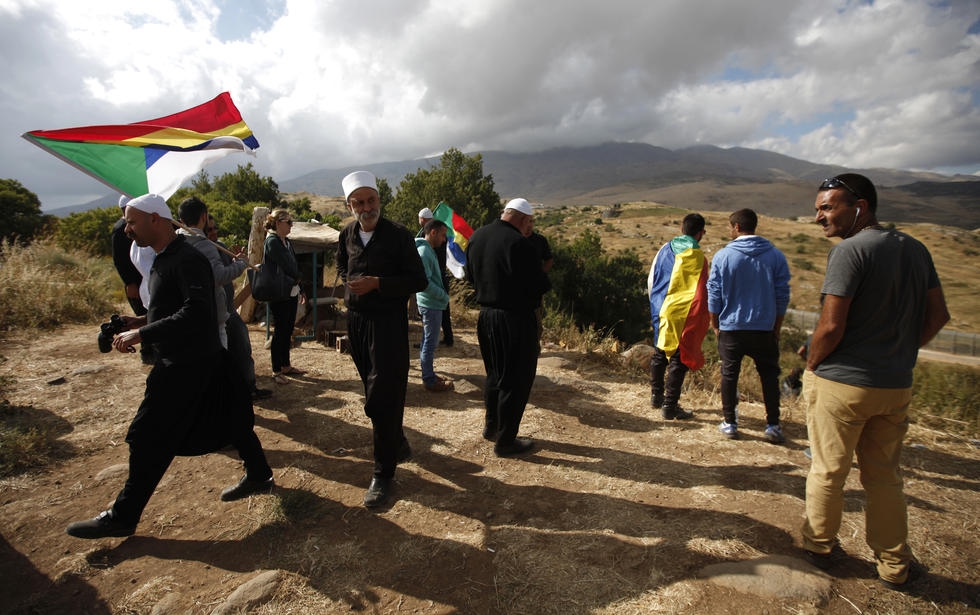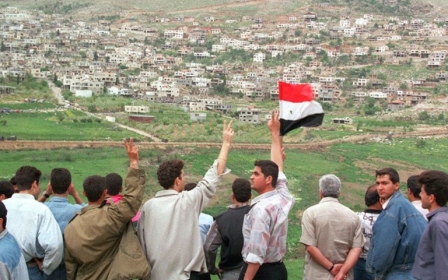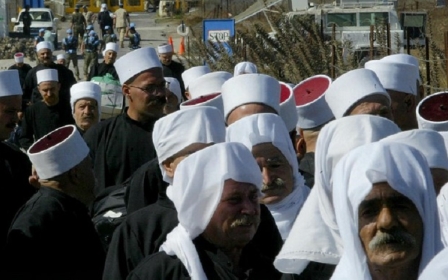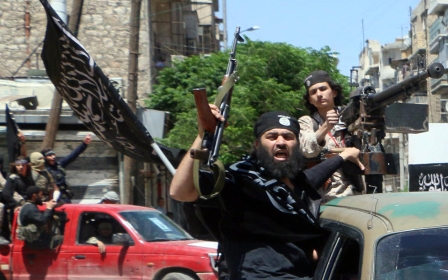Druze protests spark Syria war spillover

Israel does not have a reputation in the Middle East of being a good neighbour. As the latest report commissioned by the UN Human Rights Council on the war on Gaza last summer shows, Israel is better known for the war and destruction that it wreaks, than the humanitarian aid that it gives. So, it is understandable why Israel chose to publicise the aid it has given to hundreds of Syrian citizens wounded in the civil war, either in military field hospitals on the border or in various Israeli hospitals.
Yet this very act is now at the core of a rising internal conflict with one of the most loyal non-Jewish minorities within Israel, the Druze. Two ambulances carrying wounded Syrians were attacked during recent days by Druze militants, one in northern Israel and the second in the occupied Golan Heights. In the second case, one of wounded Syrians was beaten to death when tens of Druze youngsters stormed a military ambulance which passed through the Druze village of Majdal Shams.
According to the angry Druze, the aid given by Israel to the wounded coming from the Syrian inferno is anything but innocent. Israel, they claim, is bringing them into its hospitals as part of its overall aid and support to the Syrian opposition, especially to Jabhat al-Nusra, the al-Qaeda affiliated militia which has taken control of large parts of the areas close to the border with Israel.
This aid became extremely sensitive for the Druze, since two weeks ago militiamen from the same Jabhat al-Nusra massacred 20 Druze civilians in Idlib province in northern Syria. The general feeling among the Druze in Israel is that their brothers in Syria are under attack, and Israel, instead of helping them, is giving aid to their killers.
Israel has never officially admitted having any relations with the rebels in Syria, but reports allege that it is not involved only in humanitarian aid to wounded civilians who find their way to reach the border with Israel.
The Syrian official media has claimed that Israeli-made weapons and military equipment were found in the hands of opposition forces. The UN observer force in the occupied Golan Height (UNDOF) reported seeing Israeli soldiers passing unspecified "boxes" to Jabhat al-Nusra over the border. Unnamed rebel sources told Middle East Monitor that Israel provided Jabhat al-Nusra with maps, intelligence information and even bombed Syrian army positions in order to help the organisation take over the strategic town of Quneitra, near the border crossing in the Golan Heights.
While some of the Syrian wounded transferred to Israeli hospitals were certainly women and children, it is evident that the majority of them were combatants. In a report on Israeli Second Channel just a few days before the lynching incident near Majdal Shams, most of these wounded Syrians identified themselves as being combatants in the Syrian Free Army, but it is clear that combatants from Jabhat al-Nusra are also treated in Israel. Those interviewed did not hide their feeling towards the Druze. "We will not defend them," they said, "They murdered our brothers."
This civil war in Syria finds the Druze, a close religious sect spread over Israel, Syria and Lebanon, in a peculiar situation. Their 700,000-strong community in Syria is closely related to the Assad regime. Druze officers serve in high positions in the regime's army and
Druze militants were involved in the Shabiha, the much feared pro-governments militias. The fact they are viewed as heretics by the likes of Jabhat al-Nusra or Islamic State (IS) does not make their position any easier.
In Israel the Druze community - which counts 120,000 people - is closely related with the regime, especially through service in the army and other security forces. They are the only non-Jewish community subject to compulsory military service from 1956 and they do it with zeal. According to official figures, 83 percent of Druze youth enlist for military service, mostly to combat units, in comparison with only 75 percent among Jewish youth. More Zionist than the Zionists themselves.
Many Druze live in mixed villages with Muslims and Christians and they all speak Arabic, but that does not prevent most of them from identifying with Israel in its conflict with the Palestinians. In Operation Defensive Edge in Gaza last summer, a Druze commander led the Golani brigade, considered one of the most trigger happy in the Israeli army, into the bloody battle in the Shejaya neighbourhood in Gaza.
Nazih Kabalan, a journalist from the Druze village of Beit Jan in northern Israel, says that under Ottoman and British rule, the Druze always felt persecuted. Israel, almost from its first days, embraced them. On Israel's Independence Day, he writes, you would see more Israeli flags in Beit Jan than in Tel Aviv. In the last elections, Avigdor Lieberman's right-wing Israel Beitenu (Israel Our Home) party got more votes than any other party among the Druze.
Although Druze villages suffered from land confiscations and harsh development restrictions, as was the fate of all Arab villages inside Israel, they still enjoy some privileges compared with their Israeli Palestinians neighbours. "When I go the airport and show that I served in the army, I pass without any problem,” admits Kabalan to me. "A man with the same first name as mine from Sakhnin (an Arab village) will be delayed for at least three hours."
The Druze paid a high price for this identification with Israel. More than 400 Druze soldiers have been killed serving in the Israeli army. Beit Jan has the highest ratio of casualties per capita in the whole of Israel, including Jewish towns and villages. Therefore, explains Kabalan, the Druze feel that Israel has a moral obligation towards them. So when their brothers in Syria are threatened, they expect Israel to come to their rescue, as the community would have done if any Jewish minority would have been in danger.
Yet Israel seems to have different considerations. Maybe it has not vowed to bring about the downfall of Bashar al-Assad, but it certainly wants him weaker, enough that it is ready to ally itself, partly or fully, with an al-Qaeda affiliated group such as Jabhat al-Nusra. The continuation of the civil war in Syria seems like an Israeli interest, and as such, the enemies of its enemies from Iran and Hezbollah become its temporary yet very strange friends.
The Israeli Druze are remote from these tactical considerations. They see Jabhat al-Nusra getting close to the main Druze population centre in Jabel al-Druz in south-west Syria on the one side, and Islamic State encroaching from the other. The massacre of Druze civilians in Idlib province is still an isolated incident, but Israeli Druze are convinced that if Assad should fall, the fate of their kin in Syria will be doomed.
The attacks on the ambulances carrying wounded Syrians stems from this basic fear. Kabalan says that many young Druze in Israel feel betrayed. They are ready to die for the sake of the Jewish state, but this state is not ready to die for them. Calls for the abolition of compulsory service in the Israeli army have become popular in the local Druze social media. The deadly attack on the ambulance in Majdal Shams was carried out by Druze from the occupied Golan Heights who are not Israeli citizens and do not serve in the army, but they were influenced by widespread demonstrations in Druze villages inside Israel.
Israel is aware of these fears and according to some reports is pressuring the Syrian rebels to stay away from Druze territory. It also allows for the Druze in Israel to financially support their brothers in Syria. No one in Israel wants to see the Israeli Druze rebel against an army in which they themselves serve.
Yet as the Assad regime gets weaker, no one can vouch for the fate of the Druze minority when Jabhat al-Nusra, Islamic State or even the mainly Sunni Syrian Free Army take over. Plans for absorbing hundreds of thousands of Druze refugees on the Israeli side of the border have been made, but it is doubtful if they will be implemented when need comes. Creating a Druze independent area or mini-state under Israeli influence was on the agenda in 1948, but the chances it will happen now are very slim.
So Israel is left with hard choices. It wants to support Assad's enemies, but it hates to see them win. Because if they take over Syria, Israel may see tens of thousands of Israeli Druze pouring to the border to defend their brothers on the other side, regardless of what official Israel tells them to do. The Syrian internal war might then become an internal Israeli conflict. The attacks on the military ambulances might be just the first glimpses of this nightmare.
- Meron Rapoport is an Israeli journalist and writer, winner of the Napoli International Prize for Journalism for an inquiry about the stealing of olive trees from their Palestinian owners. He is ex-head of the News Department in Haaertz, and now an independent journalist.
The views expressed in this article belong to the author and do not necessarily reflect the editorial policy of Middle East Eye.
Photo: A picture taken from the Israeli-annexed Golan Heights shows Druze men residing in Israel holding their community's flag and gathering to watch smoke rise in the horizon of the Syrian Druze village of Hadar, on June 20, 2015, following Syrian army airstrikes against opposition rebel fighters. (AFP)
New MEE newsletter: Jerusalem Dispatch
Sign up to get the latest insights and analysis on Israel-Palestine, alongside Turkey Unpacked and other MEE newsletters
Middle East Eye delivers independent and unrivalled coverage and analysis of the Middle East, North Africa and beyond. To learn more about republishing this content and the associated fees, please fill out this form. More about MEE can be found here.





